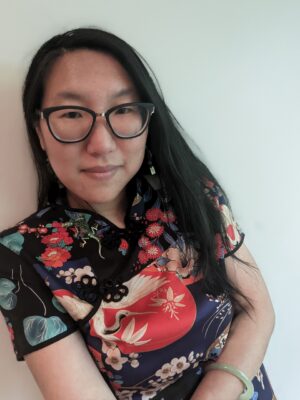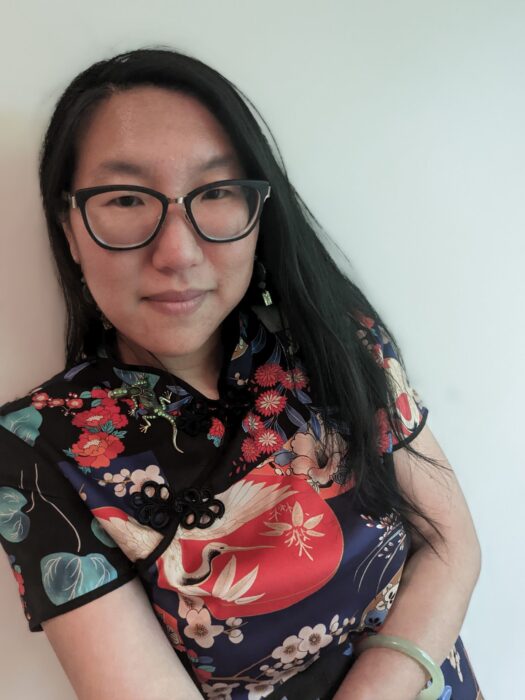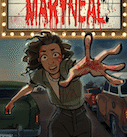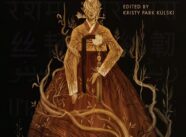
The first thing I think of when I sit down to write this introduction is a well. It’s a deep one, made of chipped stone blocks in the courtyard of an abandoned house somewhere between Anhui and Guangdong in the late 1930s. My 7-year-old grandmother is hiding in an empty residence with the women of her family – her mother, Popo, Nai Nai, and her 5-year-old sister. Her brother and father are missing, and the oldest sisters fled their Anhui home weeks ago with neighbors.
The well is important because that is where my grandmother encounters her first ghost. At least that is what she tells a 12-year-old me decades later in Palmdale, California.
“I went outside because my mother was crying so loud in the house,” she explains.
“What was she crying about?” I ask.
She never gives me the answer. Instead, she describes the pale blue handkerchief bobbing in the well.
“Every time I reached out, the handkerchief sank under the water.”
“Did you ever get it?”
She shakes her head. “I almost fell in. Had a fever for weeks after.”
My grandmother doesn’t mention that this is during the Second Sino-Japanese War. Nor does she say that the women are squatting in an abandoned house, hiding from rapists, or that they travel in the darkest night near the main path and crouch in the mud to avoid soldiers marching on the road.
She doesn’t say any of this, but all the same, the intergenerational trauma transfers through the omissions, like communication through the synaptic gaps between neurons.
This is why when I hear the word “diaspora,” I often mishear it as “despair.” Not because I am sad at the violence of history, but because the absence of our stories creates craters of silence. And oftentimes we silence ourselves.
This is also why the work of API/AANHPI creatives in horror is essential. Horror lends itself to unpacking and processing fear, loss, violence, forced displacement, migration, racism, trauma, identity, and grief. Horror also showcases survival and redemption. In short, it is a genre uniquely gifted with the tools to explore the things we don’t want to talk about and to be unquiet about the things we should say.
The featured creatives for HWA’s API/AANHPI month are horror specialists who fortify their work with the richness of heritage and lived experiences. I am honored and humbled by this opportunity to introduce these writers and poets. Through their work, you will find mastery of craft, unforgettable storytelling, and the mirrors and windows that enlighten and brighten our reading experience.
For my own part, I see now that intergenerational trauma is, in fact, inherited resilience bequeathed as a birthright. The stories are not gone, but survive in our blood, and it is our turn to tell them, should we choose to.
 Frances Lu Pai Ippolito (she/her) is a Chinese American judge, mom, writer, and publisher in Portland, Oregon. Her writing has appeared in several venues, including Nightmare Magazine, Flame Tree’s Asian Ghost Stories, Chromophobia, Mother: Tales of Terror and Love, and Unquiet Spirits. She is the founder of game and book publisher Demagogue Press and the award-winning nonprofit, Qilin Press, which focuses on community stories. She is also the co-editor of three cozy horror anthologies through Underland Press and serves as a HWA Trustee. But most importantly, she believes in ghosts. Find her here on Instagram: @demagogue_press & @qilin_press
Frances Lu Pai Ippolito (she/her) is a Chinese American judge, mom, writer, and publisher in Portland, Oregon. Her writing has appeared in several venues, including Nightmare Magazine, Flame Tree’s Asian Ghost Stories, Chromophobia, Mother: Tales of Terror and Love, and Unquiet Spirits. She is the founder of game and book publisher Demagogue Press and the award-winning nonprofit, Qilin Press, which focuses on community stories. She is also the co-editor of three cozy horror anthologies through Underland Press and serves as a HWA Trustee. But most importantly, she believes in ghosts. Find her here on Instagram: @demagogue_press & @qilin_press




